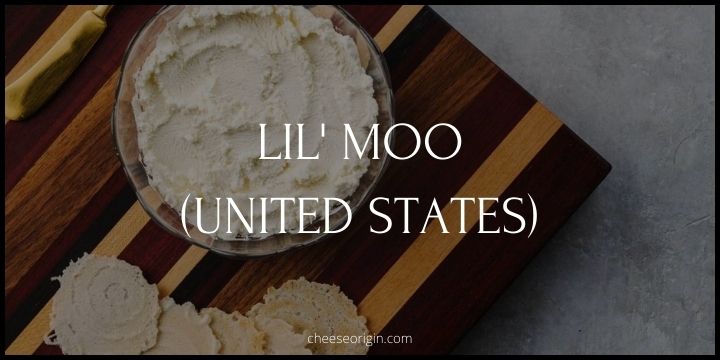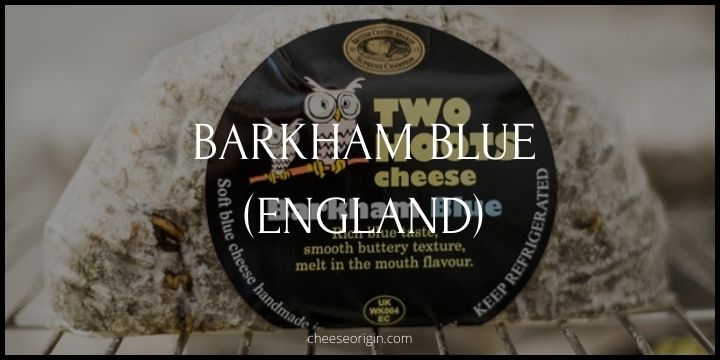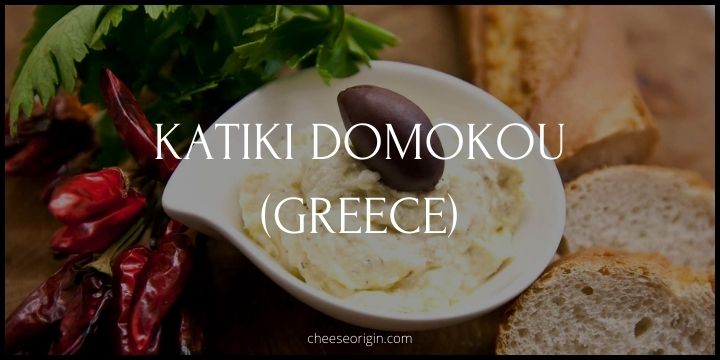What is Danish Blue (Danablu)? Denmark’s Favorite Blue Cheese
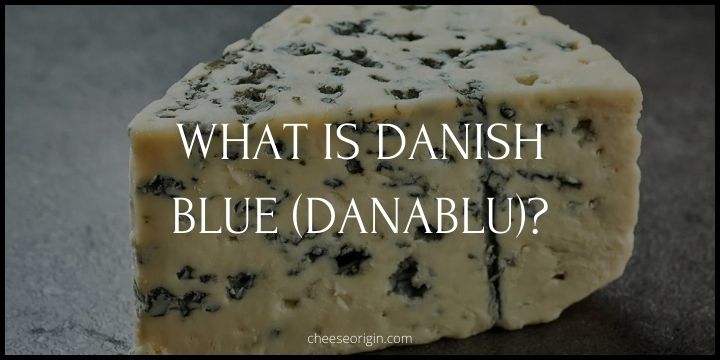
Welcome to the world of Danish Blue – Denmark’s beloved blue cheese, affectionately known as Danablu. This semi-soft marvel is a testament to the Danish flair for creating exceptional dairy products.
With its distinctive blue veins and creamy, crumbly texture, Danablu is a culinary delight that stands tall in the pantheon of blue cheeses. Loved for its strong, tangy flavor and rich heritage, it’s not just a cheese – it’s a taste of Denmark’s timeless tradition.
Quick Facts About Danish Blue (Danablu)
| Quick Fact | Details |
|---|---|
| Origin | Denmark |
| Cheese Type | Semi-soft, Blue Veined |
| Milk Type | Cow’s Milk |
| Taste | Mild, slightly sharp with hints of bitterness |
| Texture | Creamy and crumbly |
| Color | White with characteristic blue veins |
| Aging Time | 8 to 12 weeks |
| Fat Content | Around 25-30% |
| Pairings | Sweet wines, fruits, dark breads |
| Serving Suggestions | Crumbled on salads, melted in sauces, paired with wine |
| Popular Use | Used in gourmet cooking, cheese platters |
| Health Benefits | Good source of protein, calcium |
| Shelf Life | Can be kept for several weeks if stored properly |
| Storage | Should be wrapped in foil and kept in the fridge |
| Availability | Available year-round |
| Interesting Fact | The blue veins are developed by piercing the cheese with stainless steel needles to let air into the core |
What is Danablu?
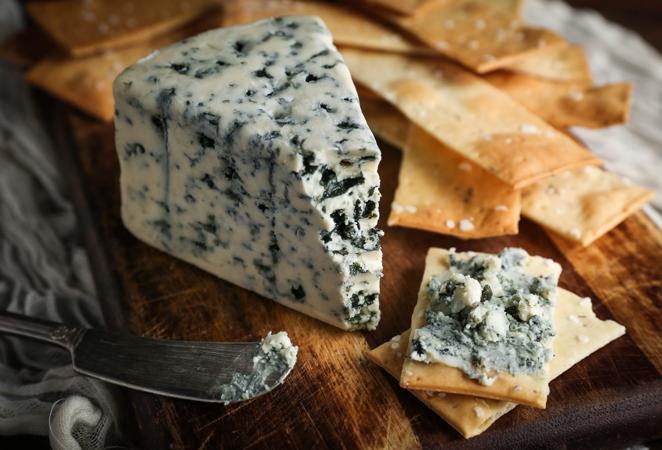
Danablu, or as it’s more commonly known, Danish Blue, is a testament to Denmark’s long-standing cheese-making tradition. This semi-soft, blue-veined cheese is a delight for both the eyes and the palate. Its creamy white base, laced with characteristic blue veins, makes it stand out on any cheese platter, while its unique flavor profile leaves a lasting impression.
Born from the rich, full-bodied milk of Danish cows, Danablu’s taste is an intriguing blend of mild sharpness and slight bitterness. Each bite unravels a tapestry of flavors, from the delicate creaminess of the cheese to the bold, earthy notes of the blue veins. It’s a cheese that invites you to savor it slowly, to fully appreciate the complexity of its character.
The texture of Danablu is another highlight. Creamy yet subtly crumbly, it melts beautifully in the mouth, making it a popular choice for gourmet cooking. Whether it’s crumbled over salads, melted into sauces, or simply served with a slice of dark bread and a glass of sweet wine, Danablu adds a touch of Danish elegance to any dish.
But what truly sets Danablu apart is its creation process. The cheese is aged for 8 to 12 weeks, and during this time, it’s pierced with stainless steel needles. These piercings allow air to enter the cheese, promoting the growth of the blue mold that gives Danablu its distinctive veins and flavor. This meticulous process reflects the attention to detail that goes into every wheel of Danablu, making it a cheese that’s not just enjoyed, but truly experienced.
In short, Danablu is more than just a cheese. It’s a piece of Denmark’s culinary heritage, a tribute to the art of cheese-making, and above all, a celebration of flavor. Whether you’re a cheese connoisseur or a curious foodie, Danablu is a cheese that’s sure to delight.
What Does Danish Blue Taste Like?
Danish Blue has a mild yet slightly sharp taste, with hints of bitterness that add complexity. The blue veins in the cheese contribute an earthy and moldy undertone, which contrasts beautifully with the overall creaminess of the cheese.
We also detect a hint of saltiness. Despite its rich and robust flavor, Danish Blue is generally milder and less pungent compared to other blue cheeses like Roquefort or Gorgonzola. Its unique flavor makes it a versatile choice for various dishes, as well as a delightful addition to any cheese platter.
Danablu Tasting Notes
- Appearance: Danish Blue presents a creamy white color with characteristic blue veins running throughout. It’s semi-soft and has a slightly moist, crumbly texture.
- Aroma: It has a subtle yet inviting aroma. The scent is mild and slightly tangy, hinting at the complex flavors within.
- Taste: The taste of Danish Blue is a blend of mild sharpness with a slight bitterness. There’s a distinct earthiness that comes from the blue veins, adding depth to its flavor profile.
- Texture: The texture of this cheese is creamy yet crumbly. It melts well on the tongue, releasing its unique flavors gradually.
- Aftertaste: Danish Blue leaves a lingering aftertaste that’s mildly tangy and slightly salty. The finish is smooth and leaves you craving for another bite.
What is the Difference Between Danish Blue and Gorgonzola
| Feature | Danish Blue | Gorgonzola |
|---|---|---|
| Origin | Denmark | Italy |
| Milk Used | Cow’s milk | Cow’s milk |
| Texture | Semi-soft, slightly moist, and crumbly | Softer, creamier |
| Appearance | Creamy white with distinctive blue veins | Pale yellow with blue-green veins |
| Taste | Mild sharpness with a hint of bitterness. Earthy undertones from the blue veins | Milder and creamier compared to other blue cheeses. Less intense, making it more approachable |
| Aroma | Mild and slightly tangy | Sharp and strong, distinctive smell |
| Aging Process | Aged for 8 to 12 weeks, pierced with stainless steel needles to promote the growth of blue mold | Two types: Dolce (sweet) aged for 2-3 months, Piccante (spicy) aged for over six months |
| Serving Suggestions | Can be crumbled over salads, melted in sauces, or served as part of a cheese platter | Often used in risottos, pasta, pizza, and served with honey or fruits |
>> Click here to read our in-depth guide on Gorgonzola
How to Eat Danish Blue (Danablu)?
- Cheese Platter: Add Danish Blue to your cheese board. Its unique flavor and appearance make it a standout addition. Pair it with a variety of crackers, fresh fruits like pears and grapes, and a selection of nuts.
- Salads: Crumble Danish Blue over your favorite salads. It pairs particularly well with pear, walnut, and arugula salad or a classic Cobb salad.
- Baking: Use Danish Blue in your next baking project. It can be a delicious filling for savory pastries or a surprising twist in your homemade bread.
- Sauces: Melt Danish Blue into your sauces to add depth and richness. It works well in cream-based sauces for pasta or steak.
- Desserts: For a savory-sweet contrast, pair Danish Blue with honey or sweet preserves. You could also try it with dark chocolate for an unexpected yet delightful combination.
- Wine Pairing: Enjoy a slice of Danish Blue with a glass of wine. Sweet dessert wines, Port, or full-bodied red wines like Cabernet Sauvignon are excellent choices.
- Sandwiches: Elevate your sandwich game by adding slices or crumbles of Danish Blue. It pairs well with roast beef, turkey, or even a veggie sandwich for a burst of flavor.
- Pizza Topping: Replace your traditional pizza cheese with Danish Blue for a gourmet twist. The cheese’s creaminess and sharpness work wonderfully with a variety of toppings.
Top 10 Danish Blue (Danablu) Substitutes
| Cheese | Flavor Profile | Texture | Best Used In |
|---|---|---|---|
| Gorgonzola | Rich, buttery, slightly sweet | Soft, crumbly | Pasta, risotto, salad |
| Roquefort | Sharp, tangy | Crumbly, moist | Cheese board, salads, dressings |
| Stilton | Rich, tangy, slightly sweet | Creamy, crumbly | Cheese platter, salads, soups |
| Blue Castello | Mild, slightly sweet and salty | Creamy, spreadable | Cheese board, sandwiches, sauces |
| Picos de Europa | Bold, spicy | Semi-soft, creamy | Cheese platter, sauces, dressings |
| Cambozola | Mild, creamy | Soft, creamy | Cheese board, sandwiches, salads |
| Bleu d’Auvergne | Strong, pungent | Creamy, smooth | Cheese platter, sauces, salads |
| Maytag Blue | Sharp, pungent | Crumbly, moist | Cheese board, salads, dressings |
| Fourme d’Ambert | Mild, fruity | Creamy, firm | Cheese platter, sauces, salads |
| Provolone | Mild to sharp | Semi-hard, smooth | Sandwiches, pizza, pasta dishes |
What Pairs Well With Danish Blue?
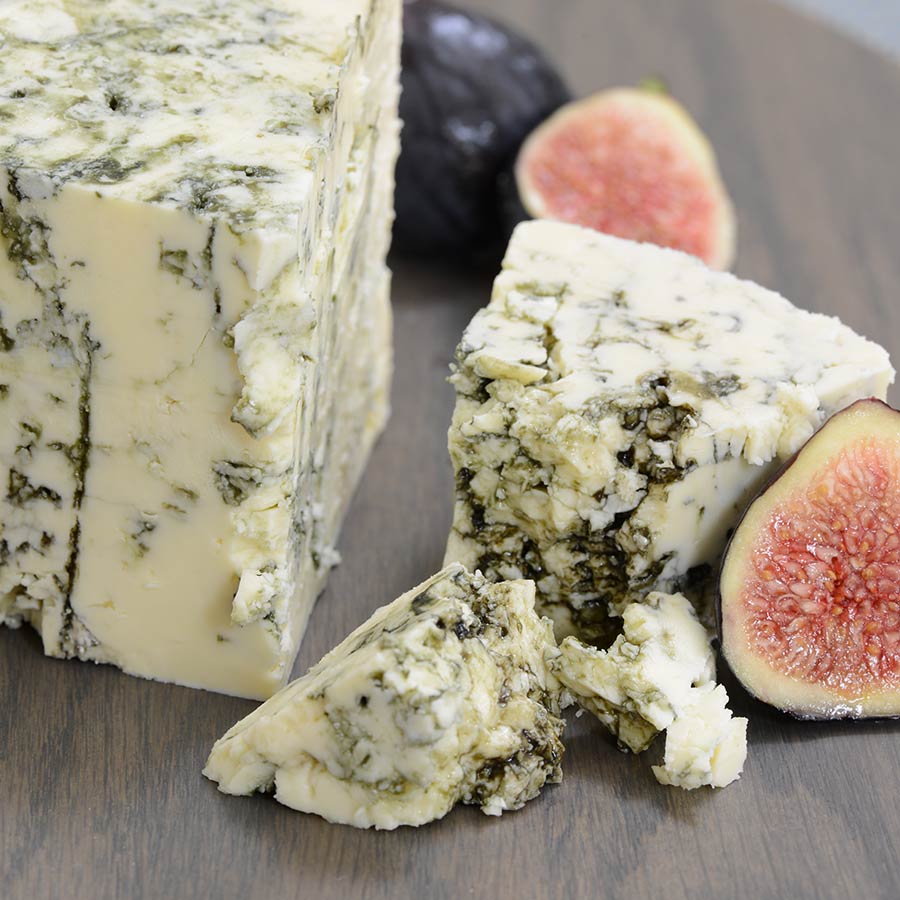
Food that goes well with Danablu:
| Category | Food | Description |
|---|---|---|
| Bread/Biscuits | Baguette, Ciabatta, Crackers, Rye Bread | These bread types provide a neutral base that allows the flavor of the Danablu to shine. |
| Fruits | Pears, Apples, Figs, Grapes | These fruits have a sweet flavor that contrasts nicely with the strong, salty taste of Danablu. |
| Meats | Prosciutto, Salami, Roast Beef, Mortadella | The saltiness of these cured meats complements the strong flavor of the Danablu. |
| Vegetables | Arugula, Spinach, Radicchio, Roasted Bell Peppers | These leafy greens and roasted vegetables can balance out the rich and creamy flavor of the Danablu in salads. |
| Nuts & Seeds | Walnuts, Almonds, Pecans, Pine Nuts | The crunch and mild flavor of these nuts provide a nice contrast to the creamy, strong flavor of Danablu. |
| Condiments & Spreads | Honey, Fig Jam, Quince Paste, Olive Tapenade | These sweet condiments can help balance the strong, salty taste of the Danablu. |
| Seafood | Smoked Salmon, Anchovies, Sardines, Grilled Shrimp | The strong flavors of these seafood options pair well with the equally strong flavor of Danablu. |
| Desserts | Dark Chocolate, Dried Fruits, Shortbread Cookies, Cannoli | These desserts offer a sweet counterpoint to the salty, tangy flavor of Danablu. |
| Pasta & Grains | Ravioli, Gnocchi, Risotto, Farro Salad | The versatility of these pasta and grains dishes allow for a variety of Danablu toppings. |
| Herbs & Spices | Basil, Oregano, Rosemary, Black Pepper | These herbs and spices can help enhance the bold flavor of the Danablu. |
Also read: 11 Best Crackers that Pair Well with Cheese
Beverage that goes well with Danablu:
| Category | Beverage | Description |
|---|---|---|
| Wine | Port, Riesling, Sauternes | These sweet wines balance the strong, salty taste of Danablu. |
| Beer | Stout, Belgian Ale, IPA | The bitter notes in these beers contrast nicely with the creamy, tangy flavor of Danablu. |
| Spirits | Whiskey, Brandy, Armagnac | These spirits have a strong, bold flavor that can stand up to the equally strong flavor of Danablu. |
| Non-Alcoholic | Apple Cider, Grape Juice, Pear Nectar | These non-alcoholic beverages offer a sweet counterpoint to the salty, tangy flavor of Danablu. |
| Tea | Earl Grey, Chamomile, Green Tea | The subtle flavors of these teas provide a calming balance to the bold flavor of Danablu. |
| Coffee | Espresso, French Press, Cold Brew | The robust flavors of these coffee preparations pair well with the strong, pungent taste of Danablu. |
Also read: Best Wine and Cheese Pairings: The Ultimate Guide
Frequently Asked Questions
1. Is Danish blue hard or soft?
Danish Blue, also known as Danablu, is a semi-soft cheese. It has a creamy and crumbly texture with characteristic blue veins due to the mold cultures added during its production.
2. Is Danish blue a healthy cheese?
Danish Blue, like most cheeses, can be part of a healthy diet if consumed in moderation. It’s a good source of protein, calcium, and vitamin B12. However, it’s also high in saturated fat and sodium, which should be consumed in limited amounts for a balanced diet.
Also read:
- What is American Grana? Redefining Parmesan in the US
- What is Tilsit Cheese? An Age-Old Culinary Secret
- What is Maasdam? The Dutch Cheese with Swiss Roots
- Top 10 Most Popular Semi-hard Cheeses in the World
- What is Maredsous Cheese? Belgium’s Loaf-Shaped Legacy
- What is Fromage de Herve? Belgium’s Soft Cheese Sensation
- What is Appenzeller? The Swiss Cheese with a Secret Recipe



